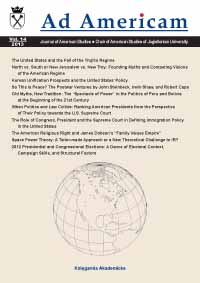The United States and the Fall of the Trujillo Regime
The United States and the Fall of the Trujillo Regime
Author(s): Marcin FatalskiSubject(s): Politics / Political Sciences
Published by: KSIĘGARNIA AKADEMICKA Sp. z o.o.
Summary/Abstract: Rafael Trujillo, who governed the Dominican Republic in the years 1930‑1961, was one of the most recognizable Latin American dictators. Trujillo created one of the most repressive regimes in Central America, even when compared with other dictatorships of this cruelly governed region. Till the late 1950s, his position in the eyes of U.S. policymakers was stable. He maintained order in the country and upheld an anti‑Communist policy, both an internal and foreign one. In the late 1950s, the Trujillo regime became the subject of growing criticism in the United States and other American republics. The Eisenhower and Kennedy administrations were concerned that a continuation of the Trujillo regime would provoke a Castro‑like revolution in the Dominican Republic. Kennedy also criticized Trujillo for his violation of human rights, which was contrary to the new program of U.S. policy toward Latin America. Kennedy promoted democracy and reform to avoid the threat of a Communist revolution. The U.S.A. supported the conspiracy against Trujillo in order to overthrow the dictator and establish a “moderate pro‑American government.” After the assassination of the dictator, pressure from the U.S. frustrated Trujillo’s son’s attempts to maintain the regime, and protected the transition of the Dominican Republic to a democratic system.
Journal: Ad Americam. Journal of American Studies
- Issue Year: 2013
- Issue No: 14
- Page Range: 7-18
- Page Count: 12
- Language: English

